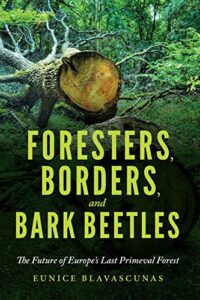 When it comes to remaining stands of European forest, the Białowieża Forest of eastern Poland and western Belarus is the one most often cited in regard to the importance of its conservation, the significance of the ecological research that takes place within it, and the political controversies in which it occupies a central flashpoint.
When it comes to remaining stands of European forest, the Białowieża Forest of eastern Poland and western Belarus is the one most often cited in regard to the importance of its conservation, the significance of the ecological research that takes place within it, and the political controversies in which it occupies a central flashpoint.
A UNESCO World Heritage site, the Białowieża Forest covers nearly 142,000 hectares of the trans-border region of Poland and Belarus, making it the largest primeval forest left standing in all of Europe. It is home to a remarkable variety of life, including the largest remaining herd of the European Bison, Bison bonasus, as well as lynx, wolf, fox, and a host of other mammal, bird, reptile, amphibian, invertebrate, plant, and fungi species. Among the aforementioned invertebrates is included the Spruce Bark Beetle, Ips typographus, a species of particular recent interest to the forest and the title-referenced bark beetle of Prof. Eunice Blavascunas‘ recently published Foresters, Borders, and Bark Beetles; The Future of Europe’s Last Primeval Forest from Indiana University Press.
In her new book, Prof. Blavascunas “provides an intimate ethnographic account, gathered in more than 20 years of research, to untangle complex forest conflicts between protection and use. She looks at which pasts are celebrated, which fester, and which are altered in the tumultuous decades following the collapse of communism.”
Given the number of times I’ve found references to this remarkable forest popping up in books I’ve reviewed, as well as the element of nationalist politics that has become – as has also regrettably been increasingly witnessed in discussions and debates surrounding the use and conservation of the natural areas in so many other nations – enmeshed in its management and conservation, I am eager to complete my reading of this very timely book in hopes of attaining a greater understanding of this unique forest, as well as perhaps extracting from this understanding a improved ability to analyze some of the forest use controversies presently raging in the country of my own nativity as well.
